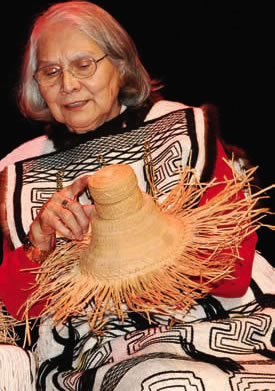Delores Churchill facts for kids
Quick facts for kids
Delores E. Churchill
|
|
|---|---|
| Ilskyaalas | |

Churchill with a partially woven basketry hat, 2006
|
|
| Born | 1929 (age 96–97) |
| Known for | Traditional weaving, language revitalization |
Delores E. Churchill (whose Haida name is Ilskyaalas) was born in 1929. She is a talented Native American artist from the Haida tribe. Delores is famous for weaving beautiful baskets, hats, and special clothing called regalia. She also works hard to keep the Haida language alive.
Learning to Weave
Delores Churchill was born in 1929 in Massett, Haida Gwaii, which is in British Columbia, Canada. She learned traditional Haida weaving from her mother, Selina Peratrovich. Her mother was also a very skilled weaver.
Delores also studied traditional Tsimshian weaving. She learned from master weavers Flora Matthew and Brenda White. She even studied at the British Museum to learn a special six-strand weaving technique. After working as a bookkeeper and raising her family, Delores returned to weaving. At that time, Haida basket weaving was becoming less common among younger people. She taught her niece, Lisa Telford, how to weave traditional Haida baskets. Delores also learned ravenstail weaving from Cheryl Samuel.
Delores Churchill is a very important Haida weaver. She knows a lot about finding and preparing materials like cedar bark and spruce roots. Her weaving skills and knowledge are known all over the world. She has taught weaving classes and shown her artwork in many places. She also helps museums identify old weaving pieces in their collections.
Her Artwork
Delores Churchill creates useful and ceremonial items. She often uses spruce root, cedar bark, wool, and natural dyes in her work. Some of her beautiful artwork is on display at the Totem Heritage Center in Ketchikan, Alaska. She has also taught basket weaving courses there.
Saving the Haida Language
Delores Churchill is one of the few people who still speak the Haida language fluently. She has worked hard to share her language with others. In the past, both Canada and the United States tried to stop Native children from speaking their languages. This happened especially in boarding schools. When Delores was a child, she went to a Canadian residential school. Her teachers made her speak English and punished her for speaking Haida.
Even with these challenges, Delores has always wanted to protect her native language. She often works with Haida children to teach them the language. She also helped her daughter, April Churchill, with language preservation efforts.
Awards and Honors
Delores Churchill has received many awards for her amazing work. Some of these include:
- Alaska State Council on the Arts fellowship
- United States Artists Fellowship, 2020
- Lifetime Achievement Award from the Central Council of Tlingit and Haida Indian Tribes of Alaska, 2017
- National Basketry Association Lifetime Achievement Award, 2017
- National Heritage Fellowship from the National Endowment for the Arts, 2006
- Lifetime Fellowship Award, Rasmuson Foundation, 2006
- Connie Boochever Fellowship, 2003
- Governor's Award for the Arts, 2003
- First People's Fund Community Spirit Award, 2002
- National Endowment for the Arts, Creative Artists Residencies, Hull, Quebec, 1996
- Fellow, Canadian Museum of Civilization, Hull, Quebec, 1996
- Honorary Doctorate of Humane Letters, University of Alaska Southeast, Juneau, 1991
- The Lisle Fellowship, Art and Culture in Mexico, Guadalajara, Mexico, 1991
- Alaska State Legislative Award in recognition of commitment to Native art, 1986

